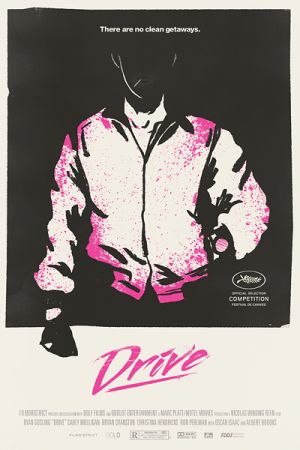
By Remington Smith
Nicolas Winding Refn should be mandatory viewing for film nerds. The audacity and craftsmanship of his filmmaking put him on par with the likes of Darren Aronofsky (see Refn's Bronson), but with a sense of subtlety (Valhalla Rising). Pair Refn with the magnetic Ryan Gosling (Half Nelson, Lars and the Real Girl) and a high concept heist film that co-stars Bryan Cranston, and you have an unholy concoction of brilliant variables unseen since the release of the Double Down (with less heart disease). But this is far from an action film...
A man stands at a motel window looking out on the L.A. nightscape, curtly giving instructions to someone on a cell phone. The motel tv is displaying a basketball game. The man tosses the phone on the bed, picks up a bag, and leaves. Merely known as "Driver," he offers five minutes to transport thieves to safety, that's it. On the road he's a musician on wheels, barely breaking his stride when cops give chase or helicopters have him in their omnipresent spotlight. The personal and professional cross when furtive glances with next door neighbor Irene (Carey Mulligan) leads to an emotional involvement that propels the Driver down a messy path of best intentions.
The first half of Drive rides like a lilting codeine dream, buttressed by 80's synth tunes, smooth dolly movements and long takes. Gosling commands the screen as the enigmatic, nearly mute Driver: His stoic face as he waits for thieves returning from the job (clock ticking) or the demure smile he wears around Irene (a child with a secret in his heart), his silence allows these facial gestures to ring out like gunfire. Yet the dream cannot stay in tact, as it fractures to splinters when Gosling has to take care of business.
Though the car sequences feel realistic, well choreographed, and thrilling (the heists themselves are thrumming with delightful tension), at its core, Drive is a character drama. What stays with you isn't the action, but the haunting dichotomy of the Driver's personality. Similar to Tom Stahl in A History of Violence, our hero's actions, and the fact that we are witnesses to his brutality, complicates our allegiance.
None of this is new for Refn, whose previous two films (Bronson, Valhalla Rising), deal primarily in a currency of violence and what that violence does to a person. Despite his successes in such meditations in those films, Drive might serve as his best draft on the discourse.
The atmosphere (stemming from Refn's direction and a killer soundtrack), the driver with no name, and the atypical conclusion all add up to a film erecting its own mythic status. Drive is a cocky bastard, swaggering with a cool that Miles Davis would have to admire - and damn if it doesn't have every right to be.
-Remington Smith
*Republished with permission, thefilmsmith.com